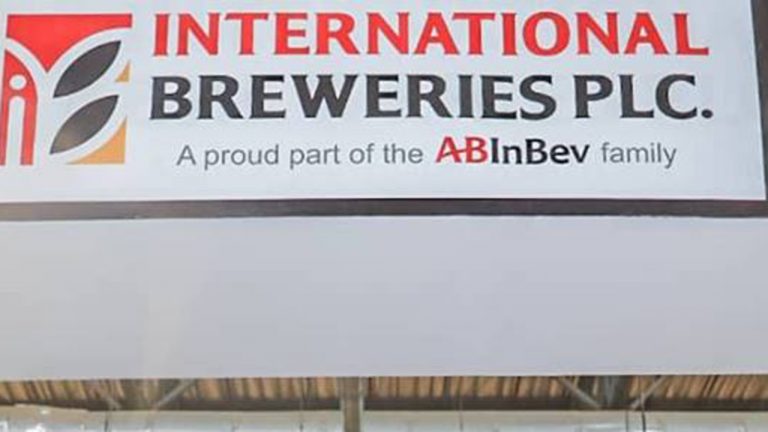In what may be pointing to the need for Anheuser-Busch InBev SA/NV (ABInBev), a Leuven, Belgium based multinational drink and brewing holdings company to rethink its strategy in Nigeria with its acquisition of majority stake in Ilesa, Osun State-based International Breweries Plc, the company continues to gasp for breathe from the effect of an unhealthy combination of low purchasing power among consumers and stiff competition across all of its product range.
This fact is clear again from the half-year numbers released by International Breweries on Tuesday to the Nigerian Stock Exchange (NSE), which was a confirmation of the first quarter score-card. Unless something dramatic happens therefore, shareholders of the company, including the majority owner may not expect any returns on their investment from Africa’s biggest market, even as investors hope that the Nigerian economy might rev into action when the ministers take office and the 2019 budgetary spending begins, with the year already more than halfway through.
For International Breweries, however, it may be comforting enough that it is not in a class of its own when the majority of score-cards so far released to the market are reviewed.
Highlights of the result showed that although revenue from the sale of alcoholic and malt drinks rose by an impressive 29.05%; cost of sales swallowed all of that robust growth, rising by 41.11%; even as marketing and promotion, as well as administrative expenses, soared at an even faster rate, following which loss after tax climbed by over 100% despite the 52.54% increase in tax rebate.
Specifically, revenue rose by N15.431bn or 29.05% from N53.109bn in the first half of 2018 to N68.63bn; while the cost of sales inched N13.239bn or 41.11% higher from N32.196bn to N45.437bn. The growth was driven principally by materials consumed and allocated overheads, which jumped from N24.671bn to N33.921bn; followed from afar off by the N8.015bn depreciation in plant and equipment, compared to the previous N5.552bn; resulting in gross profit of N23.193bn, up by N2.286bn or 10.93%, compared to the N20.911bn in 2018.
Other income inched to N43.142m from N25.53m, as income from the sale of scrap dropped from N11.772m to N5.353m; while sundry income grew to N37.789m from N13.759m. Net impairment losses on financial assets for the period climbed by N422.298m or 178.64%; marketing and promotion expenses rose by N3.158bn or 30.5% from N10.352bn in the 2018 half-year to N13.51bn, boosted by transportation and distribution expenses at N6.616bn, as against N4.619bn in 2018 half-year. Advertising and promotion cost stayed flat at N4.565bn from N4.163bn; employee benefits expense rose from N1.569bn to N2.328bn.
Other net gains stood at N429.527m, an improvement from the preceding half-year’s N1.602bn loss; administrative expenses ballooned to N12.993bn, rising by N5.191bn or 66.53% from N7.802bn to N12.993bn. A breakdown of this showed that depreciation soared from N2.511bn to N6.099bn; followed by business running costs of N3.289bn from N2.511bn; salaries, wages and allowances (admin staff) at N1.86bn, compared to N1.574bn in 2018; and the N1.559b other staff-related costs, an increase from N1.188bn.
These resulted in N3.497bn operating loss, compared to the previous N943.448m profit; which was worsened by the significant 89.92% drop in finance income to N511,000; from N5.07m in 2018; a time also when finance costs climbed from N6.191bn to N7.029bn, representing N838.184m or 13.53% rise.
Loss before tax, therefore, soared by N5.283bn or 100.77% from N2.846bn in 2018 to N6.841bn. Company income tax expense rose to N68.173m from N63.673m; just as deferred tax credit increased to N3.752bn, up by N1.292bn or 52.54% from N2.46bn. Loss after tax reduced to N6.841bn from N6.841bn, representing 135.59% rise, translating to a loss per share of 80 kobo, compared to 33 kobo in 2018.
Meanwhile, Japanese beer company Asahi announced on the Tokyo Stock Exchange on Friday, July 19, 2019, it had agreed to acquire Carlton & United Breweries from Anheuser-Busch InBev for $16bn, allowing Asahi to “commercialise the portfolio of AB InBev’s global and international brands in Australia.”
Sale of the Melbourne, Australia-based Carlton & United Breweries (CUB) which was acquired in 2018, is expected to help AB InBev “accelerate” its expansion into other fast-growing markets in the Asia Pacific Accreditation Cooperation (APAC) and globally.
“We continue to see great potential for our business in APAC and the region remains a growth engine within our company,” Carlos Brito, Chief Executive of AB InBev was quoted as saying.
AB InBev said the funds raised from the mega-money sale will be used to “pay down debt”, but stressed the business is not relying on this sale to stay afloat.
The company, which operates in nearly 50 countries, reported its revenue for 2018 was $77.3bn.
The sale to Asahi is expected to be completed in the first quarter of 2020.
Trending Today
Menu








